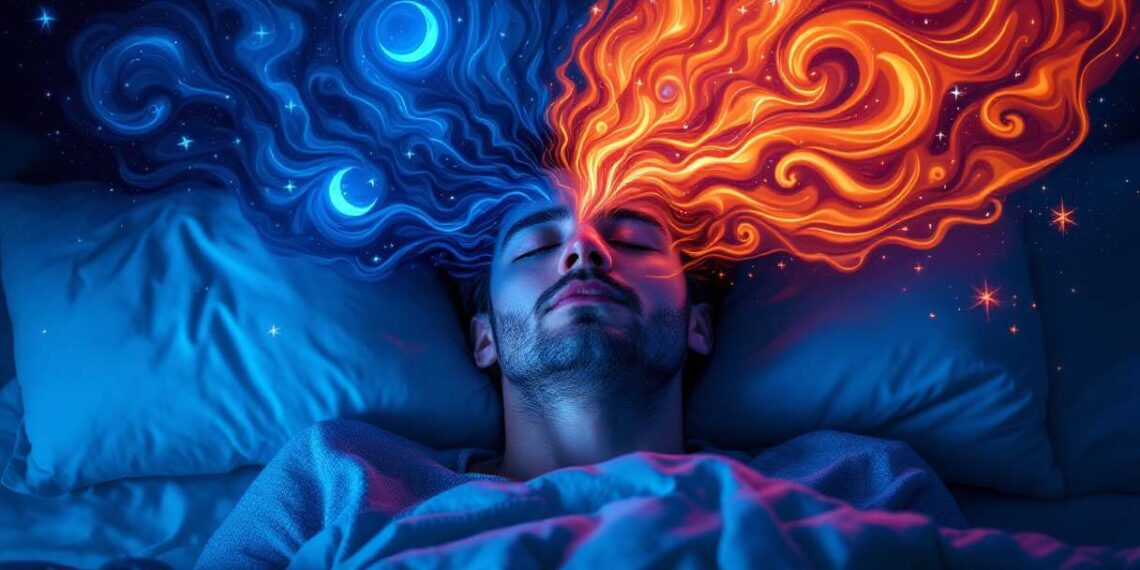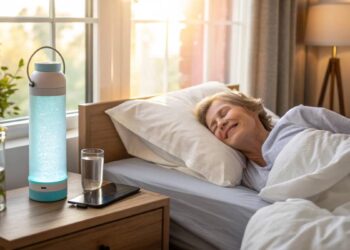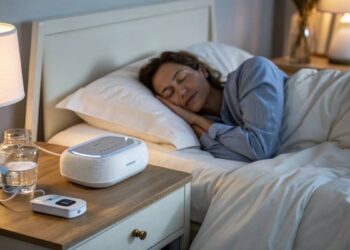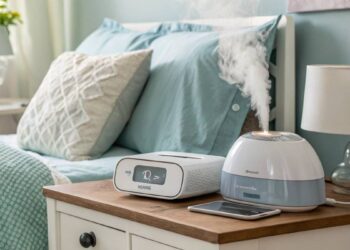Ever find yourself lying awake at 3 AM, caught in a maddening loop of racing thoughts and restless tossing? You’re not alone in this midnight battle. The complex dance between insomnia and anxiety affects millions, turning what should be peaceful nights into exhausting marathons of consciousness.
Whether you’re counting sheep for the thousandth time or watching your mind put on an unwanted late-night show of worries, understanding the intricate relationship between sleep struggles and anxiety could be your first step toward reclaiming your nights. Let’s unravel the mystery of why your brain won’t shut off when your body’s begging for rest.
Deciphering Sleep Struggles
Introduction to Insomnia and Anxiety
Struggling with sleep, especially dealing with insomnia and anxiety, can mess up your daily grind. Insomnia is that stubborn issue where falling asleep feels like a herculean task, or you keep waking up at all the wrong times. Anxiety just loves to hop on this train, making your mind race with worries that make things worse. If you’re tossing and turning, replaying the ‘what-ifs’ and can’t seem to catch those Z’s, you’re not alone in this loop of sleeplessness and stress.
| Sleep Issue | Description |
|---|---|
| Insomnia | Trouble sleeping, whether it’s falling asleep or staying asleep. |
| Anxiety | Never-ending worries that like to mess with your sleep. |
Different folks face these problems for lots of reasons. People dealing with long-term insomnia, new parents learning to survive on little sleep, night shift workers, older folks, and anyone on meds that mess with sleep are prime candidates for these sleep thieves. Understanding how these two troublemakers dance with each other is the start to figuring out how to sleep better.
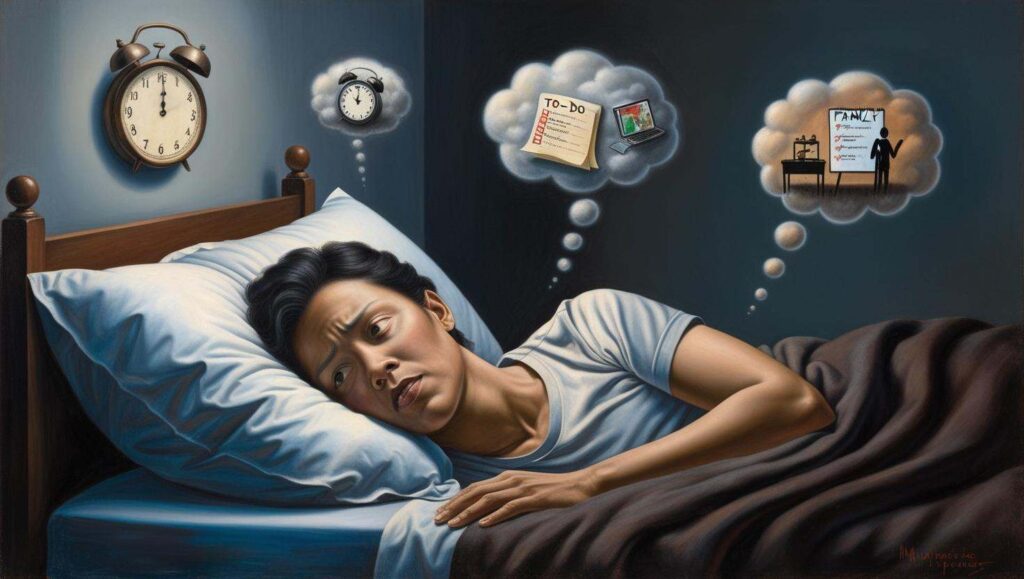
The Impact of Sleep Disorders
Sleep issues like insomnia don’t just leave you yawning all day—they hit both mind and body hard. Missed sleep messes with your mood, ramping up irritability and stress. Your brain, running on empty, might start lagging behind, making it harder to remember stuff or think straight.
Here’s a glimpse at what sleep disorders can do to you:
| Effect | Description |
|---|---|
| Mood Changes | You might find yourself grumpier, anxious, or feeling blue. |
| Cognitive Issues | Memories might slip away, or decisions bog you down. |
| Physical Health | Increased risks for problems like weight gain, diabetes, or heart issues loom larger. |
| Quality of Life | Juggling daily tasks, friendships, or jobs gets tougher. |
For those battling insomnia, anxiety is often an uninvited guest that refuses to leave. The less sleep you get, the more anxious you become, trapping you in a vicious cycle. If you’re pondering about the mystery of “why can’t I fall asleep,” check out resources diving into insomnia and sleep pressure for some helpful insights and tips.
Understanding Insomnia
Tossing and turning all night? You’re not alone. Insomnia is the sneaky thief that robs millions of their Zs, putting a damper on their days. By getting to know this crafty sleep stacker inside-out, folks can spot when it’s time to sound the alarm and get back on the track to dreamland.
“Sleep is the best meditation, but anxiety is meditation’s worst enemy.” – Dalai Lama
Types of Insomnia
Insomnia comes in different flavors, served cold and unwanted. Here’s a rundown:
| Type of Insomnia | What’s Going On |
|---|---|
| Acute Insomnia | This is the ankle-biter of sleeplessness. Often rolls in uninvited after a stress bomb or life twist, but typically packs up and leaves after days or a couple of weeks. |
| Chronic Insomnia | This is sleep’s long-term nemesis. If you’re staring at the ceiling more nights than you care to count—three times a week for three months, actually—it’s time to dig deeper. Sometimes it’s an unwelcome sidekick to other health woes. |
| Comorbid Insomnia | When insomnia teams up with buddies like anxiety or depression. It’s a dynamic duo that requires tackling both the sleep issue and whatever else is tagging along. |
| Middle Insomnia | You fall asleep just fine, but then 2 a.m. hits and you’re wide awake, possibly gnawing on your pillow in frustration. More intel on this pest in middle insomnia causes. |
Causes of Insomnia
What prompts insomnia to crash the slumberland party? A mixed bag of annoyances:
| Cause | What To Blame |
|---|---|
| Stress and Anxiety | Minds spinning with worry can keep sleep at bay. The nasty chemistry here raises cortisol, the anti-sleep hormone. More on this culprit at insomnia vs anxiety. |
| Medical Conditions | Things like asthma or arthritis aren’t just day problems—nighttime gets its share too when they come calling. Breathing or getting comfy might turn into a real struggle. |
| Medications | Got a tick-tock in your sleep schedule? It might be your meds causing a ruckus. Have a chat with your doc if you think your pills might be the party poopers. |
| Hormonal Changes | For many, it’s bye-bye sleep when hormonal shifts occur—ahem, menopause and pregnancy. Take a peek at pregnancy insomnia remedies for possible relief. |
| Lifestyle Choices | Are your sleep routines all over the map? Too much caffeine chugging or couch surfing can spell trouble for getting those essential winks. Shake things up with some exercise for insomnia for potentially better nights. |
Grappling with insomnia can feel like chasing shadows, but being in the know can light up a path to restful nights. Check out a sleep hygiene checklist or chill out with some meditation for sleep. Sweet dreams could be just around the corner.
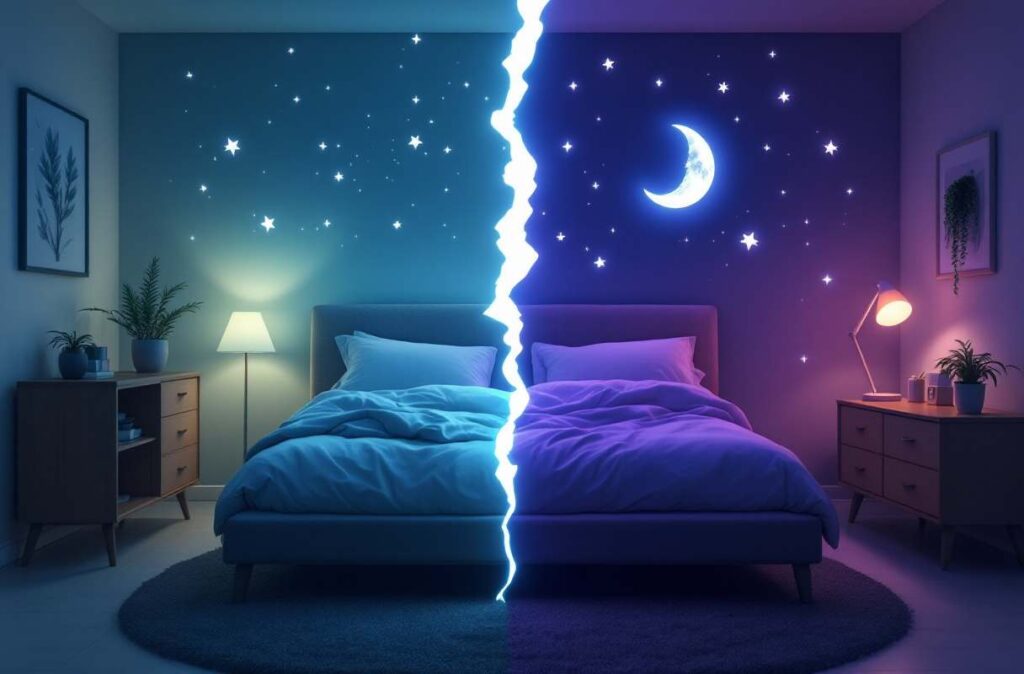
Digging Into Anxiety-Related Sleep Woes
Anxiety and Sleep
Anxiety can be a real sleep stealer, leaving folks tossing and turning as worries crowd their minds. Different types of anxiety, whether it’s the everyday jitters, panic freak-outs, or social stress, can throw a wrench into catching those Z’s.
Figuring out the mess between anxiety and sleep means seeing how they mess with each other. Feeling more anxious? You’re probably sleeping worse, and round and round it goes. Check out some common sleep gremlins related to anxiety in the table below:
| Sleep Problem | What’s Going On |
|---|---|
| Can’t Hit the Hay | Thoughts run wild, making it tough to drift off. |
| Constant Wake-Ups | Anxiety pokes you awake at all hours, ruining your rest. |
| Up with the Birds | You wake way too early, thoughts racing like a speedy train. |
| Spooky Nightmares | Anxiety can bring along scary dreams that make bedtime a dread. |
How Anxiety Messes with Sleep
Anxiety doesn’t just mess with your mind—it messes with your body too. With a spike in stress hormones like cortisol, you’re wired and tense, the whole relaxing-before-bed thing seems impossible.
Let’s break it down a bit more. Anxiety shows up with a bunch of symptoms that mess with sleep:
| Symptom Type | Usual Signs |
|---|---|
| Mental | Mind races, nonstop worries, dread |
| Physical | Heart’s pounding, muscles tight, drippy sweat |
Those swamped with sleepless nights and anxiety are in need of some good tricks. Things like DIY sleep hygiene tips, chill meditation routines, and workouts to help you snooze can put both anxiety and sleep issues in check.
We’ve got tons more if you’re full of questions about bedtime battles. Dive into can’t shut off at night and breaking free from insomnia—they’re jam-packed with tips for better sleep minus the anxiety!
Distinguishing Insomnia from Anxiety
Sleeping troubles—ugh, right? But figuring out if it’s insomnia or anxiety messing with your snooze is the key. Both can knock you sideways, but they’re not the same beast.
Symptoms and Characteristics
While insomnia and anxiety can crash together at night, they each have their own calling cards.
| Symptom | Insomnia | Anxiety |
|---|---|---|
| Struggle to drift off | One of the biggest issues | Not as common |
| Nighttime wake-ups | Often, especially in the wee hours | Usually with a mind that’s racing |
| Up too early | Yep, you’ve got an early bird | Not so much |
| Daytime sleepiness | You bet | Happens a lot |
| Worry or doom | Not a typical guest | Always crashing the party |
| Bouncing before bed | Seldom seen | Pretty regular |
Use this table as your cheat sheet to pin down insomnia or anxiety. If your brain’s doing somersaults at 2 AM, anxiety might be pulling the strings. If sleep’s playing hard to get with no other drama, consider insomnia your foe. Pound the digital pavement for more info in our piece on why can’t I fall asleep?
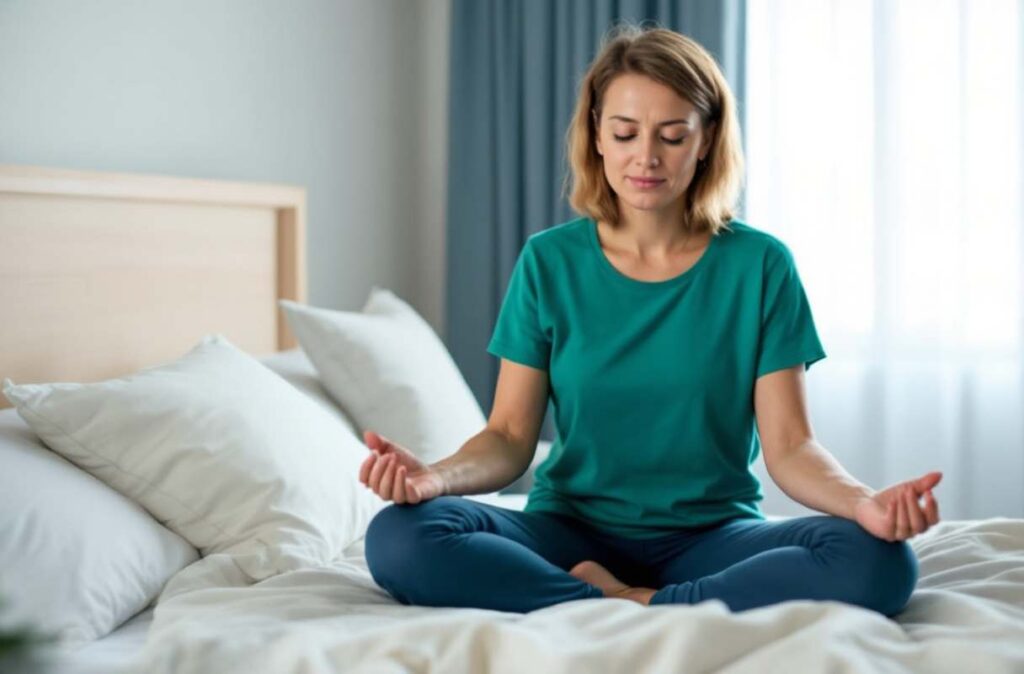
Diagnostic Differences
Doc squads tackle insomnia and anxiety with different playbooks. They dig deep to nail the root of the issue.
Insomnia Diagnosis
- Sleep History: Those zzz patterns get a full workup through logs or surveys.
- Sleep Quality Tools: Gadgets like the Insomnia Severity Index (ISI) do the trick.
- How Long It’s Been: Needs to be a three-nights-a-week ordeal for over three months, says the DSM-5 manual.
Anxiety Diagnosis
- Face-to-Face with the Pros: Mental health tales and anxiety vibes get a close-up.
- The DSM-5 Checklist: Lists fears and worries about life fronts in neon.
Both need a magnifying glass, but the focus shifts from night hours to how you feel. If both tag along—insomnia and anxiety—learning how they buddy up can open the door to solid fixes. To get a peek at how insomnia stirs up your day, click our piece on how long does insomnia last.
Factors Influencing Sleep Challenges
Ever lay in bed, eyes wide open, wondering why blissful sleep seems to elude you? Understanding the culprits behind your sleepless nights might just offer the key to better rest.
Lifestyle and Environmental Factors
Your daily choices and surroundings play a big part in how well you hit the hay. Bad habits, topsy-turvy schedules, or a chaotic bedroom can make insomnia worse. Let’s break down what’s keeping you awake:
| Factor | How It Affects Sleep |
|---|---|
| Irregular Sleep Schedule | Messes with your internal clock, leaving you jet-lagged at home |
| Caffeine Overload | Jacks up your nervous system, turning your brain into a disco party |
| Alcohol Before Bed | May start out soothing but often leads to a midnight wake-up call |
| Screen Time | Blue light is like a “stay awake” command, stopping your sleep hormone, melatonin, in its tracks |
| Bedroom Vibes | Too noisy, too bright, or too cold – your sleep environment might be like a carnival instead of a cocoon |
For those feeling sleep-deprived, kicking off solid sleep hygiene habits can be a game-changer. Also, munching on foods that help you snooze could pave the way for some sweet dreams.
The Role of Medications
Popping pills for other issues? They might be crashing your ZZZs party. Folks dealing with long-time sleep troubles or anxiety should pay attention. Here’s a glimpse at how some meds mess with your slumber:
| Medication Type | Sleep’s Worst Enemies |
|---|---|
| Antidepressants | Some could keep you up, others help you nap like a cat |
| Stimulants (think ADHD meds) | Betcha didn’t know they could make sleeping as tough as getting a cat to take a bath |
| Corticosteroids | Insomnia might hitch a ride with its consuming benefits |
| Beta Blockers | Sneak in with funky dreams or nighttime awakenings |
| Diuretics | Frequent potty breaks can become a new nighttime hobby |
If your meds are playing disruptor, chat with your doc about tweaking your treatment. Also, dive into stress-busting options like cognitive-behavioral therapy for insomnia or some good ol’ meditation for sounder sleep.
Understanding the dance between your insomnia and anxiety may offer more answers for catching those elusive ZZZs. Curious about how anxiety or its sidekick depression can mess up sleep? Dig into our pieces on depression and insomnia or the puzzling stuff about middle insomnia causes.
Coping Strategies for Better Sleep
Struggling with insomnia? Fear not, because we’ve got a few tricks up our sleeves to help you catch those elusive Z’s. Let’s dig into some sleep hygiene habits and relaxation techniques that’ll make snooze time your favorite part of the day.
“The best bridge between despair and hope is a good night’s sleep.” – E. Joseph Cossman
Sleep Hygiene Habits
Think of good sleep hygiene like brushing your teeth, except it’s for your brain. Here’s the lowdown on some game-changing habits:
| Habit | Description |
|---|---|
| Consistent Sleep Schedule | Going to bed and rising around the same hour daily (yes, even weekends!) keeps your body’s internal clock ticking just right. |
| Comfortable Sleep Environment | Make that bedroom your fortress of solitude—dark, cool, and soundless. Snazz up with cozy bedding. Got light problems? Check out best blackout curtains for sleep for some peace. |
| Limit Naps | Napping’s cool, but keep it short (20-30 min) and steer clear from late afternoon catnaps. |
| Avoid Stimulants | Cut down on the caffeine and nicotine, especially when bedtime starts knocking. |
| Limit Screen Time | Shut down the screens an hour before bed; your eyes and sleep cycle will thank you. Need advice on avoiding blue light? Peek at why can’t I fall asleep. |
Need more pointers? Peruse our sleep hygiene checklist for more nuggets of wisdom.
Relaxation Techniques
Ease your worries and lull yourself into slumber by adding these chill-out methods to your bedtime routine:
| Technique | Description |
|---|---|
| Deep Breathing | Simple: inhale, exhale. Takes the edge off and gets rid of the jitters. |
| Progressive Muscle Relaxation | Tense and let go of your muscles, bit by bit, to unwind completely. |
| Meditation | Whether getting Zen with mindfulness or guided sessions, meditation’s your ticket to snoozeville. Try meditation for sleep for a head start. |
| Gentle Stretching or Yoga | Some light stretches to shake off the stress. See exercise for insomnia for moves that work. |
| Aromatherapy | Lavender and other soothing scents can turn your room into a sanctuary of calm. |
These mellow moves can give insomnia a run for its money, paving the way for sweeter dreams. Still stuck? Break the cycle of tossing and turning with how to break the insomnia cycle.
Seeking Professional Help
Folks having a tough time catching z’s, especially those dealing with ongoing insomnia or anxiety that’s messing with their sleep mojo, should definitely chat with the pros. Knowing what’s out there can point anyone towards snooze-ville in no time.

Consulting Healthcare Providers
If sleep troubles are sticking like a bad habit, getting some face-time with a healthcare whiz is a smart move. Docs or sleep gurus can give things a good look-over and might toss out some ideas for getting those sleep woes under control, just for you.
Here’s what might happen when you huddle up with a healthcare pro:
- They’ll dive deep into your sleep saga to get the full scoop.
- Maybe run some sleep tests if they need to peek at your snooze habits.
- Yak about meds that might be messing with your shut-eye.
Jotting down your sleep routine in a diary can really help when you’re talking shop with your doc. Capturing stuff like your sleep and wake times, and how you’re feeling after a night’s rest can guide the convo.
Therapy and Treatment Options
There’s a whole toolbox of tricks to tackle insomnia, and it’s not just counting sheep. From brainy tricks like cognitive behavioral therapy (CBT) to picking the right meds, there are loads of options to put you back on Sleep Street.
| Treatment Option | Description |
|---|---|
| Cognitive Behavioral Therapy for Insomnia (CBT-I) | Aims to tweak those pesky thoughts and actions that keep you up. Many folks swear by it. Peek at does CBT-I work for the lowdown. |
| Sleep Restriction Therapy | It’s about cutting down bed time to rev up the sleep engine. There’s the whole scoop at sleep restriction therapy. |
| Medication | Sometimes a short-term nap-helper is the ticket. Other meds might get a look if stress or blues are wrecking sleep. Take a gander at depression and insomnia for more. Keeping tabs on the meds game is key. |
Flipping the script with some lifestyle changes and extra goodies like exercise, chill-out tactics like meditation, and good old-fashioned sleep hygiene can give your sleep a serious upgrade. Resources like exercise for insomnia, meditation for sleep, and a sleep hygiene checklist offer solid insights.
Getting the lowdown on what’s up between insomnia and anxiety is like piecing together a puzzle tailored just for you. This kind of custom route could include teaming up with healthcare pros to make sure you’ve got all bases covered, helping ya regain your sleep groove.
Conclusion
The journey from sleepless nights to peaceful rest isn’t always a straight path, but it’s one worth taking. Understanding how insomnia and anxiety feed off each other is more than just interesting science – it’s the key to breaking free from their grip. Whether through lifestyle changes, professional help, or a combination of approaches, there’s hope for everyone struggling with sleep issues. Remember, good sleep isn’t a luxury – it’s a fundamental need that affects every aspect of your health and well-being. By recognizing your sleep challenges and taking active steps to address them, you’re not just investing in better nights; you’re investing in better days, better health, and a better life.
FAQs
What comes first – anxiety or insomnia?
It can work both ways. Anxiety can trigger insomnia, and lack of sleep can increase anxiety. This creates a cycle that needs addressing both issues for effective treatment.
How can I tell if my sleep problems are from anxiety or something else?
Anxiety-related sleep issues often include racing thoughts, physical tension, and worry about sleep itself. Track your symptoms and sleep patterns to help identify patterns.
Will my sleep return to normal once anxiety improves?
Often yes, but you may need to rebuild good sleep habits even after anxiety decreases. Focus on consistent sleep hygiene and relaxation techniques.
Is medication necessary for treating sleep anxiety?
Not always. Many people find success with cognitive behavioral therapy, lifestyle changes, and relaxation techniques. Medication might be recommended in some cases.
How long does it take to break the insomnia-anxiety cycle?
The timeline varies by individual, but most people see improvements within 4-6 weeks of consistent sleep hygiene practices and anxiety management techniques.
Resources
- Sleep Foundation: “Anxiety and Sleep”
https://www.sleepfoundation.org/mental-health/anxiety-and-sleep - NIH: “Sleep Disorders and Anxiety”
https://www.ncbi.nlm.nih.gov/pmc/articles/PMC3181635/

